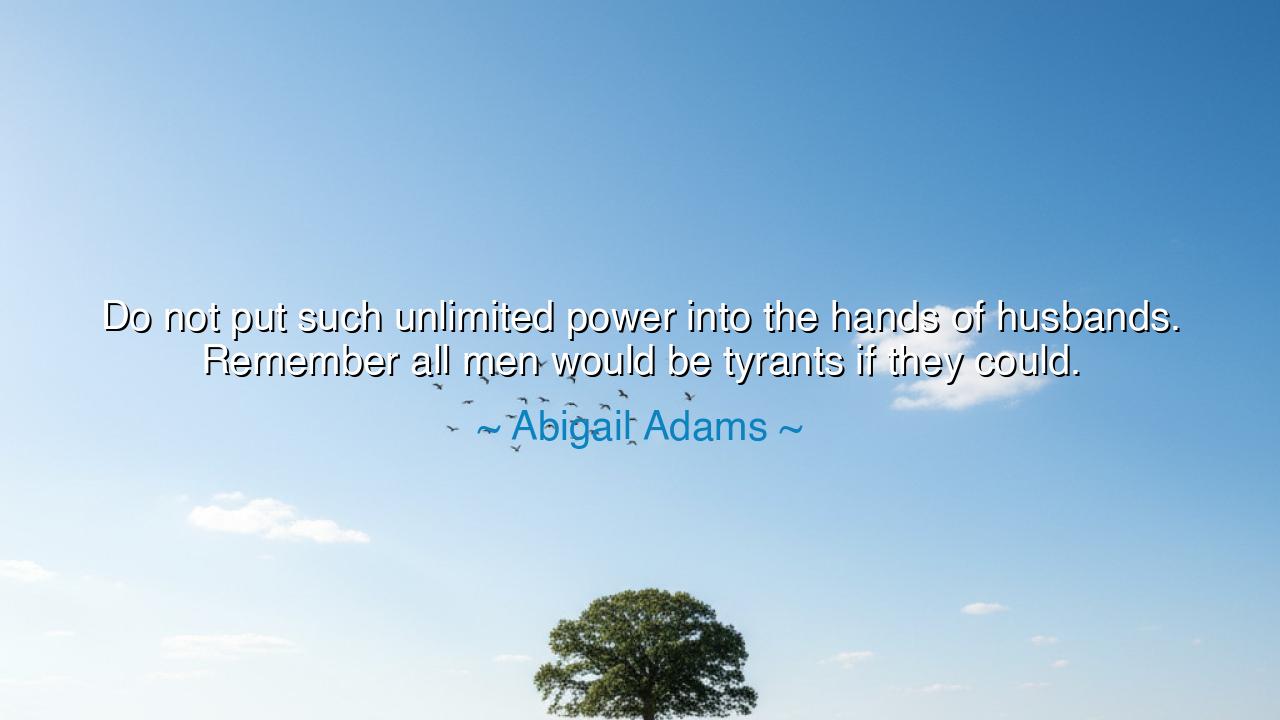
Do not put such unlimited power into the hands of husbands.
Do not put such unlimited power into the hands of husbands. Remember all men would be tyrants if they could.






When Abigail Adams wrote, “Do not put such unlimited power into the hands of husbands. Remember all men would be tyrants if they could,” she was not only speaking to her husband, John Adams, one of the architects of American liberty — she was speaking to all generations, and to the soul of justice itself. Her words, written in 1776, in the infancy of a new nation, were a plea for balance — a warning that the revolution against tyranny must not stop at the throne of kings, but must reach into the household, into the heart, into the relationship between man and woman. For what good is freedom, she asked, if half of humanity remains in bondage? What use is the cry of liberty if it is not shared by those who bear life itself?
Her warning was born not of bitterness, but of wisdom. Abigail understood the nature of power, and she knew the frailty of the human heart. “All men would be tyrants if they could,” she wrote — not as an insult to men, but as a mirror held up to human nature. Power, unrestrained by virtue or accountability, corrupts even the gentlest spirit. The ancients knew this truth well. From Plato to Aristotle, it was taught that unchecked authority turns rulers into oppressors and love into domination. Abigail, wise beyond her time, extended that same truth to marriage. She saw that tyranny begins not in empires, but in the home — that if a husband is given total rule over his wife, the seed of despotism is already sown in the soil of society.
This letter, written during the American Revolution, was part of her famous plea to her husband to “remember the ladies” when forming the new laws of the land. While men took up arms against the monarchy, Abigail fought with pen and intellect against the quiet injustices that reigned within domestic life. She had seen too many women silenced, their talents dismissed, their rights unspoken. She foresaw that a nation that preached liberty while denying it to women would be living in contradiction — a republic half enslaved by tradition. Her words carried the weight of prophecy, echoing through centuries of struggle that would one day bring forth voices like Susan B. Anthony, Sojourner Truth, and Elizabeth Cady Stanton, who continued the battle for equality she had begun in spirit.
The ancients would have honored Abigail as a seer of truth. In her tone, we hear the wisdom of Aspasia, the philosopher and counselor of Pericles, who once guided Athens with intellect as sharp as any man’s. In her courage, we find the fire of Antigone, who defied unjust law to defend what was sacred. Abigail stood between the domestic and the political, between affection and justice — a wife who loved her husband deeply, yet dared to challenge him for the sake of a higher principle. She understood that true love does not bow to power; it seeks mutual respect, for only equality can preserve affection from decay.
“Unlimited power,” she warns, is the enemy of harmony. For in love, as in governance, freedom must be shared if peace is to endure. The tyrant may win obedience, but never devotion; the oppressor may command silence, but never joy. Abigail’s wisdom stretches far beyond the household — it applies to every bond of human authority. The ruler who governs without restraint, the employer who demands without conscience, the parent who disciplines without compassion — all become tyrants in their own domain. Power without balance leads to ruin, but power shared leads to grace.
We see her truth reflected in history again and again. When monarchs refused to limit their authority, kingdoms fell. When men refused to grant women dignity, families fractured and societies stagnated. Yet when equality took root — when women were allowed to learn, to speak, to lead — civilization flourished. Consider Queen Elizabeth I, whose wisdom preserved England from chaos, or Catherine the Great, who reformed her empire with vision and courage. These women were not exceptions of nature; they were examples of what humanity achieves when power is not confined by gender.
The lesson of Abigail Adams’ words, then, is both eternal and urgent. Let no one — man or woman, ruler or servant — hold unlimited power over another. For power, like fire, must be guided lest it destroy what it was meant to warm. Love cannot thrive in fear, nor justice in domination. The wise must therefore build relationships — in marriage, in governance, in all human affairs — upon respect, dialogue, and restraint. To govern is to serve; to lead is to listen.
So remember, O listener of the ages: the first tyranny we must overthrow is the tyranny of pride. True freedom begins not in nations but in hearts. When we honor the dignity of one another — husband and wife, ruler and citizen, parent and child — we fulfill the promise that Abigail saw so clearly: that liberty, once born, must belong to all, or it will perish for everyone. Equality is not rebellion; it is the natural order of love and reason.






AAdministratorAdministrator
Welcome, honored guests. Please leave a comment, we will respond soon